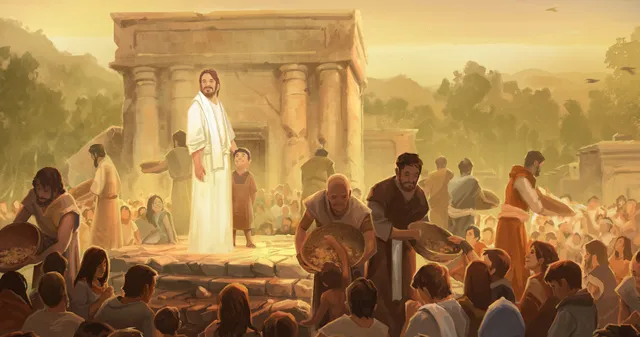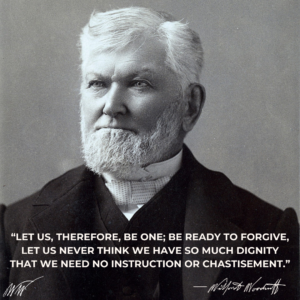
FAIR is a non-profit organization dedicated to providing well-documented answers to criticisms of the doctrine, practice, and history of The Church of Jesus Christ of Latter-day Saints.

“We Rejoice in Christ”
Book of Mormon Chapters: 3 Nephi 20–26
Historical Context: Christ teaches the Nephites about the Abrahamic covenant and expounds on the writings of Isaiah and Malachi, connecting the Nephite people to the broader plan of salvation.
Isaiah’s prophecies were crucial for understanding Christ’s mission and the gathering of Israel. Nephi, Jacob, and Christ Himself quoted Isaiah to teach eternal truths and provide context for the Nephite people, who were part of Israel’s story. Isaiah’s writings provided both doctrinal teachings and prophecies about Christ’s role as Savior.
If you have questions on this week’s reading, please email your questions to us here.
There are many principles to find in 3 Nephi 20–26. Some are highlighted in the lesson outline, but you will find others. Let Heavenly Father, through His Spirit, teach you what you need right now.
My dear young brothers and sisters, these surely are the latter days, and the Lord is hastening His work to gather Israel. That gathering is the most important thing taking place on earth today. Nothing else compares in magnitude, nothing else compares in importance, nothing else compares in majesty. And if you choose to, if you want to, you can be a big part of it. You can be a big part of something big, something grand, something majestic!
When we speak of the gathering, we are simply saying this fundamental truth: every one of our Heavenly Father’s children, on both sides of the veil, deserves to hear the message of the restored gospel of Jesus Christ. They decide for themselves if they want to know more.
Those whose lineage is from the various tribes of Israel are those whose hearts will most likely be turned to the Lord. He said, “My sheep hear my voice, and I know them, and they follow me.”3 Those who are of the house of Israel will most easily recognize the Lord Jesus Christ as their Savior and will desire to be gathered into His fold. They will want to become members of His Church, make covenants with Him and Heavenly Father, and receive their essential ordinances.
The Lord told the Prophet Joseph Smith that now, meaning our day, is the eleventh hour and the last time that He will call laborers into His vineyard for the express purpose of gathering the elect from the four quarters of the earth.
1-8: The sacrament is again administered to the Nephites. Jesus teaches that remembering Him this way will cause us to never hunger or thirst, but to always be filled.
9-13: The Lord references the prophecies of Isaiah which are included in the Nephite scriptures and shares their message and meaning with the gathered multitude.
14-29: The promises made to the House of Israel will be fulfilled in the last days, including a land of inheritance for Lehi’s seed. The Gentiles can expect negative consequences to result should they not repent and stay faithful after having received so many blessings from God.
30-46: The Savior then quotes part of Isaiah 52, which refers to the day when the promises made to God’s covenant people will be fulfilled. “The Father hath made bare His holy arm in the eyes of all the nations and all the ends of the earth shall see the salvation of the Father.” (v.35)
1-10: One sign that the final gathering of Israel is at hand will be when the Book of Mormon is made available to the scattered descendants of Lehi.
11-21: The Savior quotes the prophet Micah. Again we see that those Gentiles who do not repent and live up to the light they received cannot expect to continue to receive the Lord’s blessing. In fact, just the opposite.
22-29: However, those Gentiles that do “repent and hearken unto My word” will be numbered among the Lord’s covenant people. They will assist in building the New Jerusalem and help prepare the Earth for the second coming. “And then shall the power of heaven come down among them: and I also will be in the midst.” (v. 25)
1-17: The Savior quotes the words of Isaiah. (Compare to Isaiah 54) Though we face trials ( as a woman who wishes for children but has none) or shame (from the follies of youth) we can trust that the Savior will keep the promises made to the House of Israel. “For the mountains shall depart and the hills be removed, but my kindness shall not depart from thee, neither shall the covenant of my peace be removed.” (v. 10) Marvelous blessings and powerful protections await us.
1-3: Jesus admonishes the Nephites to give heed to the writings of Isaiah, prophecies which will be fulfilled for both the House of Israel and the Gentiles.
4-6: The Savior also commands them to record His words. Faith in Him, repentance and baptism lead to salvation, as has been taught previously by the prophets.
7-14: Jesus questions why some of the words of Samuel the Lamanite are not currently included in their sacred writings. Nephi corrects this omission, as well as documenting all the Savior’s teachings.
1: The Savior also admonishes the Nephites to record the prophecies of Malachi in their scriptures. He then quotes Malachi, chapter 3.
2-6: A messenger will come and prepare us for the second coming of the Lord. In that day, those who choose evil will not be spared from the calamities that occur, but those who are covenant Israel will be refined, as with a refiner’s fire.
7-12: As we pay our tithes and offerings we give God the chance to open the windows of heaven and pour blessings down upon us.
13-18: Though it may seem that the proud and the wicked prosper, those who love and serve God will eventually be counted as His and receive His blessings.
1-5: Continuing on the themes at the end of chapter 24, Malachi affirms that in a coming day the wicked will burn and be left without root or branch, while the righteous will receive healing and blessings. In that day, Elijah will turn the hearts of the children to their fathers and the fathers to the children.
1-5: Besides sharing the words of Isaiah and Malachi for the Nephites to record in their sacred records, the Savior also teaches the entire plan of salvation, “from the beginning until the time He should come in His glory.”
6-12: Mormon was only allowed to record in his abridgement a small portion of the Savior’s teachings as recorded on the Nephite plates. What is contained therein is what is necessary for those at the beginning of their spiritual journey.
13-21: The Savior continues His ministry among the Nephites. Miracles are performed, the sacrament is administered, spiritual gifts are manifested, even by the children and many are baptized. The people are united in love and faith.

…When we make mistakes, the Lord will lovingly correct us and will always forgive us as we repent. His kindness is reliable and constant…
When Christ visited the Nephites, He made it clear that though the righteous among them had been preserved, they still had much to change. He showed His love to them by correcting their misunderstandings and helping them work through their shortcomings.
He quoted from Isaiah, “In a little wrath I hid my face from thee for a moment, but with everlasting kindness will I have mercy on thee, saith the Lord thy Redeemer. . . . For the mountains shall depart and the hills be removed, but my kindness shall not depart from thee, neither shall the covenant of my peace be removed, saith the Lord that hath mercy on thee” (3 Nephi 22:8, 10).
When we make mistakes, the Lord will lovingly correct us and will always forgive us as we repent. His kindness is reliable and constant. We will never be perfect in this life—and God does not expect it—but He does want to lift us to a higher place as He leads us along the covenant path, our eyes raised to Him.
Wilford Woodruff counseled, “Let us, therefore, be one; be ready to forgive, let us never think we have so much dignity that we need no instruction or chastisement. Let us be humble and ponder what we are here for. Earth and hell are against us, the world hate us, and this is one of the principal proofs that God is our friend and will fight our battles, if we are faithful to Him and His commands.”[1]
 While we battle against sin, temptation, and imperfection of all kinds, our Savior will fight with us. He will take us to where He needs us to be and where we will be happiest, even if it doesn’t always seem like it in the moment.
While we battle against sin, temptation, and imperfection of all kinds, our Savior will fight with us. He will take us to where He needs us to be and where we will be happiest, even if it doesn’t always seem like it in the moment.
I have always loved this imagery by C. S. Lewis: “Imagine yourself as a living house. God comes in to rebuild that house. At first, perhaps, you can understand what He is doing. He is getting the drains right and stopping the leaks in the roof and so on; you knew that those jobs needed doing and so you are not surprised. But presently He starts knocking the house about in a way that hurts abominably. . . . [You see,] He is building quite a different house from the one you thought of. . . . You thought you were [being] made into a decent little cottage: but He is building a palace. He intends to come and live in it Himself.”[2]
I pray that I can trust in the Lord enough to make me into the mansion that He intends me to be, one who is worthy of His presence and His direction. I know that He loves us, and I know that He has a perfect plan for each of us and will lead us home.
[1] Discourse by Wilford Woodruff, December 19, 1880, p. 1, The Wilford Woodruff Papers, wilfordwoodruffpapers.org/discourse/1880-12-19.
[2] C. S. Lewis, Mere Christianity (New York: Touchstone, 1996), p. 176.
 Lyndie Jackson is working toward a degree in Public Relations at Brigham Young University. Originally from Idaho Falls, Idaho, she enjoys running, spending time with her husband and family, and reading. Lyndie served a mission for The Church of Jesus Christ of Latter-day Saints in Hermosillo, Mexico, where she developed a love for the Spanish language and the people there. She was drawn to the Wilford Woodruff Papers out of a desire to learn more about Church history and enjoys being part of the organization’s efforts to touch lives with Wilford Woodruff’s words.
Lyndie Jackson is working toward a degree in Public Relations at Brigham Young University. Originally from Idaho Falls, Idaho, she enjoys running, spending time with her husband and family, and reading. Lyndie served a mission for The Church of Jesus Christ of Latter-day Saints in Hermosillo, Mexico, where she developed a love for the Spanish language and the people there. She was drawn to the Wilford Woodruff Papers out of a desire to learn more about Church history and enjoys being part of the organization’s efforts to touch lives with Wilford Woodruff’s words.

Brother Victor L. Ludlow: Covenant Teachings of the Scriptures | Victor L. Ludlow – BYU Speeches
Sister Cecilia M. Peek: “Yea, They May Forget, Yet Will I Not Forget Thee” | BYU Speeches

FAIR is a non-profit organization dedicated to providing well-documented answers to criticisms of the doctrine, practice, and history of The Church of Jesus Christ of Latter-day Saints.
We are a volunteer organization. We invite you to give back.
Donate Now